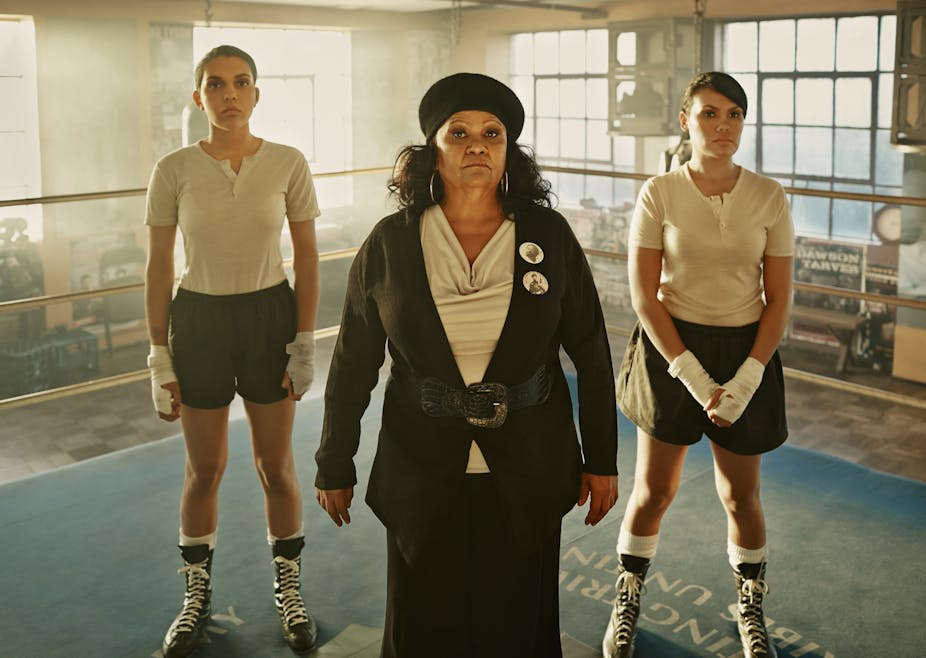I sing this song. I sing it for my sisters.
For I feel the backbone of our struggle in this country,
Trying to keep it together.
Koori Woman – Marlene Cummins
Rachel Perkins’ latest documentary, Black Panther Woman, brings to the screen the life of Australia’s foremost Indigenous female blues singer: Marlene Cummins. Like any good blues song this is a confronting and powerful story. Black Panther Woman recounts Marlene’s experience in the first and only Australian Black Panthers chapter, the abuses she suffered from men within the Indigenous community and her need to break a 40-year silence.
When we first meet Marlene, she is about to leave for a trip to New York to attend an international gathering of Black Panthers, hosted by Kathleen Cleaver, who is now a law professor at Yale. Marlene joined the Brisbane chapter of the Black Panther Party in 1972 – after falling in love with their leader, Dennis Walker.
For a year, and with just ten members, the Australian Black Panthers were at the forefront of the Aboriginal civil and land rights movement. As we learn from Cummins, Indigenous women were the backbone of the struggle – and sometimes paid a price for the cause.
Breaking the code of silence
Throughout the documentary, Cummins asserts that she has no interest in “starting a witch-hunt” and that her story is her own. Even so, Black Panther Woman offers more than a tale of one woman’s survival. Perkins’ documentary turns a critical eye on the experience of Indigenous women in the Aboriginal civil rights movement as a whole.
It asks important questions about the “code of silence” that protected the cause from media attacks. In doing so, it also denounces the white political agenda that enforced it and still holds whole Indigenous communities responsible for the actions of individuals. As Cummins says in an interview:
If we pointed the finger at one black man, they’d say it was all black men.

The voice of the archives
The complex interactions between Cummins’ personal history and the wider experience of Indigenous women in the movement is reflected in Perkins’ documentary. Black Panther Woman plays out as an observational narrative: the story takes centre stage. By interweaving interviews with archival footage from the protests of the 1970s and stills from Cummins’ personal life, Perkins provides another layer of interpretation to the events.
As in her 2007 series First Australians, the inclusion of archival materials asks the viewer to connect with the story at an emotional level. As Cummins talks about her life in the Black Panthers we are presented with personal footage from what looks like a spontaneous theatre performance.
We see a young Cummins on a day out with Dennis Walker and the rest of the Brisbane chapter members. Cummins jokes about feeling like an “Aboriginal woman superhero” at the time. We are offered a rare and precious look into what being a member of the Black Panthers must have felt like for a young Aboriginal woman.
Footage from Alessandro Cavadini’s 1972 documentary about black activism in the late 1960s and early 1970s, Ningla A-Na, is drawn into the documentary alongside Cummins’ photos. In this way Perkins provides a larger political stage for a personal history.
A blues song to start a dialogue
Black Panther Woman is also the result of a long friendship between Perkins and Cummins.
As such, it’s a documentary where the distance between director and subject is reduced to dialogue. As Cummins reflects on the violence suffered by Indigenous women, she pauses for a second and asks Perkins, “Is that what you want to hear?” Perkins replies, “I want to know why you want to tell this story.”
It’s just a brief moment, but one that speaks to the need to name the abuse and to start a conversation about the “code of silence”. Black Panther Woman breaks 40 years of silence and asks for dialogue – and it does so with the strength and grace of one of Marlene Cummins’ blues songs.
The Melbourne International Film Festival 2014 runs until Sunday August 17. See all MIFF 2014 coverage on The Conversation here.

